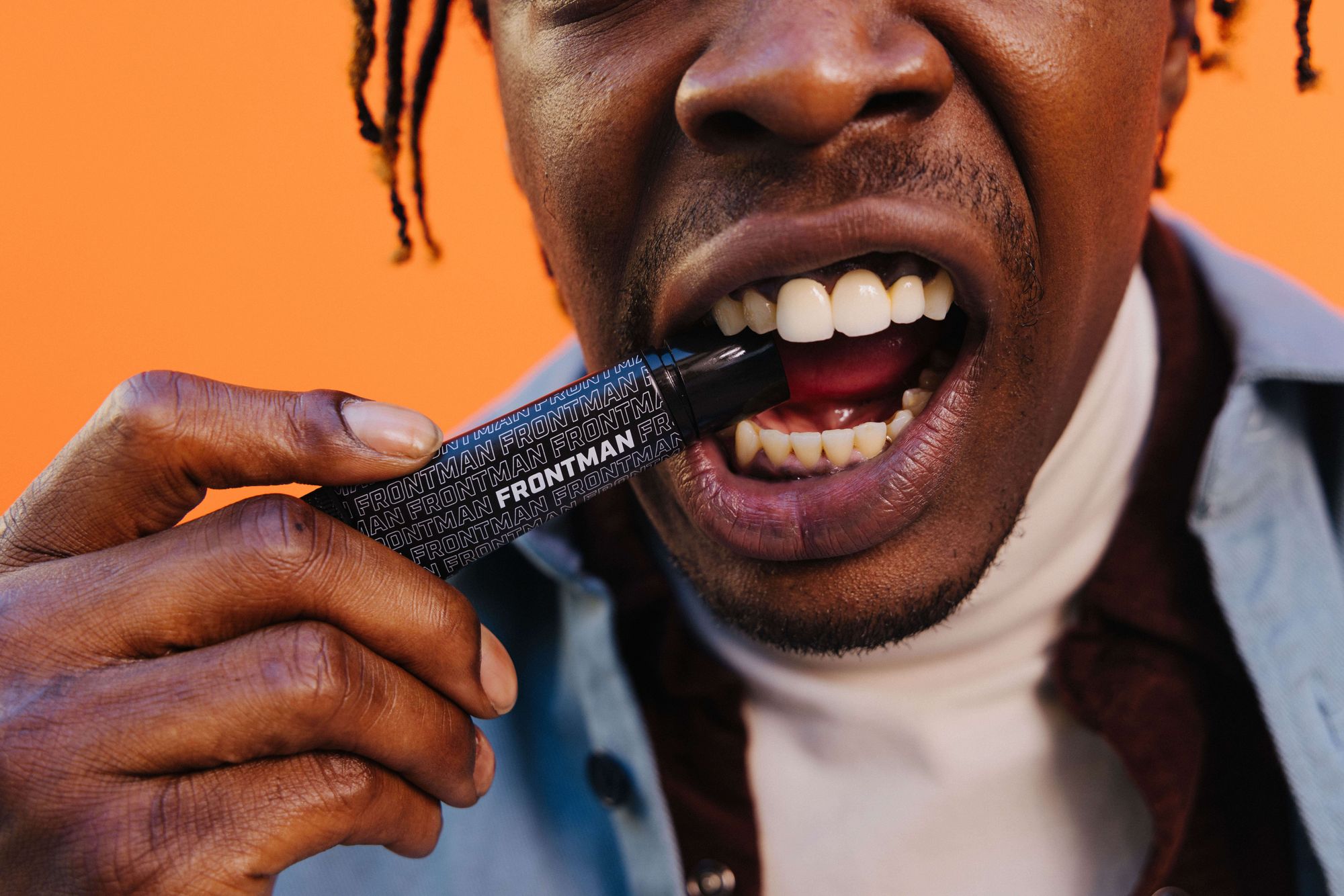My founder story is, in some ways, like many others. I saw a problem that needed solving: Men don’t have as many instant fixes for acne as women do. I met my co-founder Nick Bunn who had experienced the problem firsthand and believed in the same vision of faster acne care, while providing complimentary skills: he brought an excitement for marketing and operations, whereas I had knowledge of branding and design. Together, we saw an opportunity to reimagine the acne experience, and FRONTMAN was born.
The unusual part of my story? All of this happened during my junior year of college.
Maybe it would have made more sense to wait until after graduation to dive into our idea, focusing on our studies and daydreaming about our future company in moments between classes instead of working on it in earnest. But I was ready to work on something real, so we dove right in—and I’m so glad we did.
Because we got started early, we were able to launch within a year after I graduated, hit six figures within a year after that, and triple that number the following year. Not to mention we’ve grown from one product to ten, expanded to Amazon, and landed our first retail partnership with Urban Outfitters. All within two years of officially putting our brand into the world.
Here are some of the reasons that starting a business in college helped us, and how we used our unique position to set ourselves up for success after graduating.

We had the benefit of time
This likely isn’t news to anyone, but starting a company takes time. This is especially true for product-based companies like ours. It took us nearly two years to finalize our products because of how much effort went into iterating (plus the notoriously slow speed of the CPG industry).
Before we could start marketing and selling, we had to work with scientists and dermatologists (including my mom!) to create product formulas. We had to find product manufacturers to work with, and then get samples to test for feedback and start the process all over again. We had to get money to pay for said samples. And, having never worked in this industry before, we had to learn as we went at every step.
Luckily, we had time to spare until we really needed this to support us. I recognize that this isn’t the case for every student. While I was fortunate to have a lot of financial support through college, my co-founder Nick did not. Prior to starting FRONTMAN, he and I had worked with a student-run company and launched a small agency that offered on-campus brand activation, which gave us each some income, and Nick also picked up a bunch of flexible part-time jobs like rideshare driving to support his needs while having time to work on the company.
We were also able to create more flexible schedules than most working adults can. Again, this may be different for other students, but I was less focused on classroom learning at that point and ready to work toward my professional interests after graduation. So I looked for less demanding classes that would give me the time and brain space to focus on the company. That’s not to say it was always easy.
For instance, I remember one particularly hectic month my senior year where I was going back and forth from Boston to New York every weekend to take meetings for FRONTMAN. But I found that schedule easier to juggle than the six months after I graduated when my founder and I were both working other jobs while finalizing our product for launch.
We took advantage of any school resource we could
In an ideal world, we would have filled our class schedules with business courses that could give us the knowledge to support our growing idea. Unfortunately, our school didn’t have a business major and historically hasn’t been very supportive of student startups, so we had to get creative.
We did find one class in the engineering department that focused on research and development (R&D) and gave us credit for spending time working on our idea. That class also had a pitch competition at the end of the semester, which we won, giving us around $10,000 for our development budget.
For us, unfortunately, that’s about where the official school resources tapped out, but there are many schools that offer much more support for student entrepreneurs, and I recommend that college founders take advantage of as much as they can.
We had a vast network who were excited to help us
That’s not to say our school gave us nothing. The biggest unofficial resource available to us was a network of incredibly smart and accomplished alumni, who gave us some much-needed perspective from people a little farther ahead in their careers. Some even became our early advisors and investors.
Whenever I learned about an alum who may have been able to support our goals, I’d reach out saying: “I'm really interested in starting a skincare line. This is where we're at. You have great experience in [subject area]—could I have a few minutes of your time to get your advice?”
People are surprisingly motivated to help college students out, especially when they’re alumni of your university. They think it’s cute that you’re trying to start something, and they want to pay it forward. It could have felt belittling, but instead I was able to use it to my advantage to learn from experienced contacts who might not have been as eager to help any working professional.
We used our peers to brainstorm, to product test, and more
The other network we had access to at school was our fellow students. First and foremost, I met my founder at school and would not have been able to start this business without him.
Being in that R&D class also surrounded us with other students who were working through the same challenges we were—almost like a mini (and much less competitive) accelerator. We were able to help each other navigate different processes and approaches, bounce ideas off each other so we didn’t feel like we were making decisions alone, and share our connections to make our networks even broader.
Outside of class, we also found it helpful to tap into students who were just excited to work on something real. For every hurdle we faced or need we had, we realized there was probably someone on campus who knew more about it than we did. We worked with a lot of student marketers who were excited to work for free on projects they could add to their resume. We had a lot of really good conversations with other students about parts of the business we were stuck on. Plus, we were able to use our peers as guinea pigs to get real-time feedback as we developed our products, which really shaped the direction of our final offerings.

We had a really safe testing ground
Perhaps more than anything, I appreciated having a safe testing ground for both developing our product and learning how to be a founder.
It felt like there was very little risk to giving our idea a go while we were still in college, that there was so much less to lose than later in life when we might have more obligations. It also felt like we were given more leeway to mess up along the way and that the bar was lower than it is for more experienced founders.
For instance, when we first started, I was such a nervous public speaker. My first pitches weren’t nearly as good as they are today, but I still got some early interest from advisors, investors, and partners simply because I was energetic and compelling. Meanwhile, through practice, I was able to learn how to present my ideas more concisely, how to capture people emotionally, and how to come across as competent despite my age. I feel much more confident now having had the time to experiment and learn in that college environment. It laid the foundation for me to be a good entrepreneur now.
Do I think every student who has dreams of being a founder should get started in college? Not necessarily. I was surrounded by many who just “wanted to start something,” which I don’t believe is a good recipe for creating a long-lasting and successful company. You need to have an idea that you physically can’t stop thinking about.
It’s also by no means easy, but starting a business is never going to be easy. If you think you’ve identified a real problem that you’re excited to work on a solution for, why not get started now? It just might become a reality, too.
Try Buffer for free
190,000+ creators, small businesses, and marketers use Buffer to grow their audiences every month.




